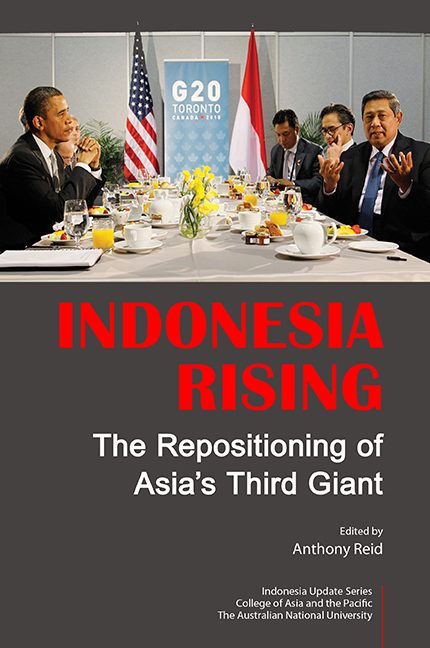Book contents
- Frontmatter
- Contents
- Tables
- Figures
- Contributors
- Foreword by Gareth Evans
- Preface
- Glossary
- 1 Indonesia's New Prominence in the World
- 2 Indonesia in the New World Balance
- 3 Indonesia's Role in the World Economy: Sitting on the Fence
- 4 Is Indonesia Rising? It Depends
- 5 Domestic Politics and International Posture: Constraints and Possibilities
- 6 Can Indonesia Lead on Climate Change?
- 7 Indonesian Muslims and Their Place in the Larger World of Islam
- 8 Indonesia's Quiet Springtime: Knowledge, Policy and Reform
- 9 Problems of Identity and Legitimacy for Indonesia's Place in the World
- Index
- INDONESIA UPDATE SERIES
8 - Indonesia's Quiet Springtime: Knowledge, Policy and Reform
Published online by Cambridge University Press: 21 October 2015
- Frontmatter
- Contents
- Tables
- Figures
- Contributors
- Foreword by Gareth Evans
- Preface
- Glossary
- 1 Indonesia's New Prominence in the World
- 2 Indonesia in the New World Balance
- 3 Indonesia's Role in the World Economy: Sitting on the Fence
- 4 Is Indonesia Rising? It Depends
- 5 Domestic Politics and International Posture: Constraints and Possibilities
- 6 Can Indonesia Lead on Climate Change?
- 7 Indonesian Muslims and Their Place in the Larger World of Islam
- 8 Indonesia's Quiet Springtime: Knowledge, Policy and Reform
- 9 Problems of Identity and Legitimacy for Indonesia's Place in the World
- Index
- INDONESIA UPDATE SERIES
Summary
Indonesia's recent emergence as a middle-income country carries with it significant implications for its overall development strategy and the role that knowledge and education play within it. Indonesia is increasingly operating in a highly competitive global economy, one that values not just the country's traditional economic strengths in natural resource extraction and low-cost labour, but also the ability to innovate and create economic value through knowledge. Development aid as a share of the national budget will continue to shrink, placing an ever-growing premium on the ability of policy makers to make smart choices about how best to spend national budgetary resources. Moreover, the continuing process of democratization carries with it demands for informed public participation through which public policy can be accessed, understood and debated by a broad range of stakeholders.
Where will the knowledge about policy options and their trade-offs come from? For a variety of reasons that will be discussed later, during the post-colonial and New Order years Indonesia did not develop the kind of domestic knowledge infrastructure that can currently be seen in other large developing countries such as China, India, Mexico or Brazil. Instead, it has always relied heavily on international technical assistance to help develop policy options that could be presented to high-level government decision makers. Nor has Indonesia made much progress in providing an incentive framework for the private sector, universities or civil society to provide these services. However, with the country's growing wealth, the transition to democracy and associated rise in the importance of public policy debate, and the increasing complexity of policy choices facing the government at both the national and subnational levels of its operation, this strategy is no longer viable.
This contribution to the book will argue that after the long winter of New Order control of the institutions of independent thinking, there are signs that new shoots are pushing their way to the surface. Their survival is by no means guaranteed, however. The genius of the New Order's control system lay not in the instances of outright oppression of critical scholars, analysts and researchers, but in the use of bureaucratic incentives to undermine the production of knowledge from within the very institutions that created and used it.
- Type
- Chapter
- Information
- Indonesia RisingThe Repositioning of Asia's Third Giant, pp. 141 - 169Publisher: ISEAS–Yusof Ishak InstitutePrint publication year: 2012

